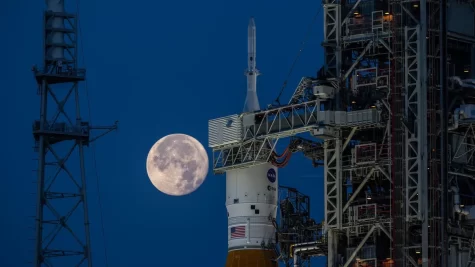
NASA/Brian Smegelsky
Mia DeRouchey |Writer & Ava Miller |Opinion Editor
September 2, 2022
NASA recently announced its new prospective mission: they promise yet another moon landing by 2025 on the vessel Artemis III from the Kennedy Space Center in Florida. The execution of the new space mission is already on the way. Preparations started on August 29, and are expected to continue until 2025. However, many are wondering if this space expedition should be a priority considering America’s rapidly declining environmental health and rising rates of economic distress.
On average, space crafts release about one ton of carbon dioxide every second after the launch. It proves to be a greater issue than other forms of CO2 emissions because space crafts release carbon dioxide through every layer of our atmosphere, eliminating the possibility of the emissions being absorbed into a carbon sink like the ocean or trees before it reaches the atmospheric layers. Pollutants spewed from spacecraft are immediately absorbed by all layers of the atmosphere as the craft travels to space. “In our current environmental state, we should be focused on our own planet,” senior Maya Kernot said. Kernot, like many, constantly encounters reminders of our polluted environment, whether it is trash on our beaches or a layer of smog in our sky. Kernot goes on to claim that “a mission to the moon would be a waste of resources”. In our fast-paced, high-population society, there aren’t many resources to spare for a mission to space primarily being done for publicity.
The 2025 prospective space mission on Artemis III will be part of the Artemis project which will end up being roughly 93 billion dollars. The end goal of the Artemis project is to establish a base on the moon that will open the doors to a mission to Mars. The space race is not over, and the United States is once again rushing to the moon to secure a jumpstart to Mars. But should a manned mission to Mars really be our first priority right now?
“I would like to see all the money being used for the moon landing to instead be used for more pressing issues like the Mississippi water crisis,” Mrs. McGuire, an AP US history teacher at San Clemente high school said. The United States is facing intense water supply issues and Mississippi is getting the worst of it. “We are not a third world country and yet thousands of people are without water in Mississippi,” she continues. America may make it to the moon in a fury of publicity, but they will do so amongst devastating conditions on our own planet.
The reinvigorated Space Race may lead to the United States finally reaching Mars, but they will launch off from a planet in environmental distress and away from the many pressing issues Americans have and will continue to be plagued with. NASA is running from our problems and taking money and resources with them.

Insightful and fully convincing…well beyond what one would expect from high school students.
Bravo, Ava and Mia